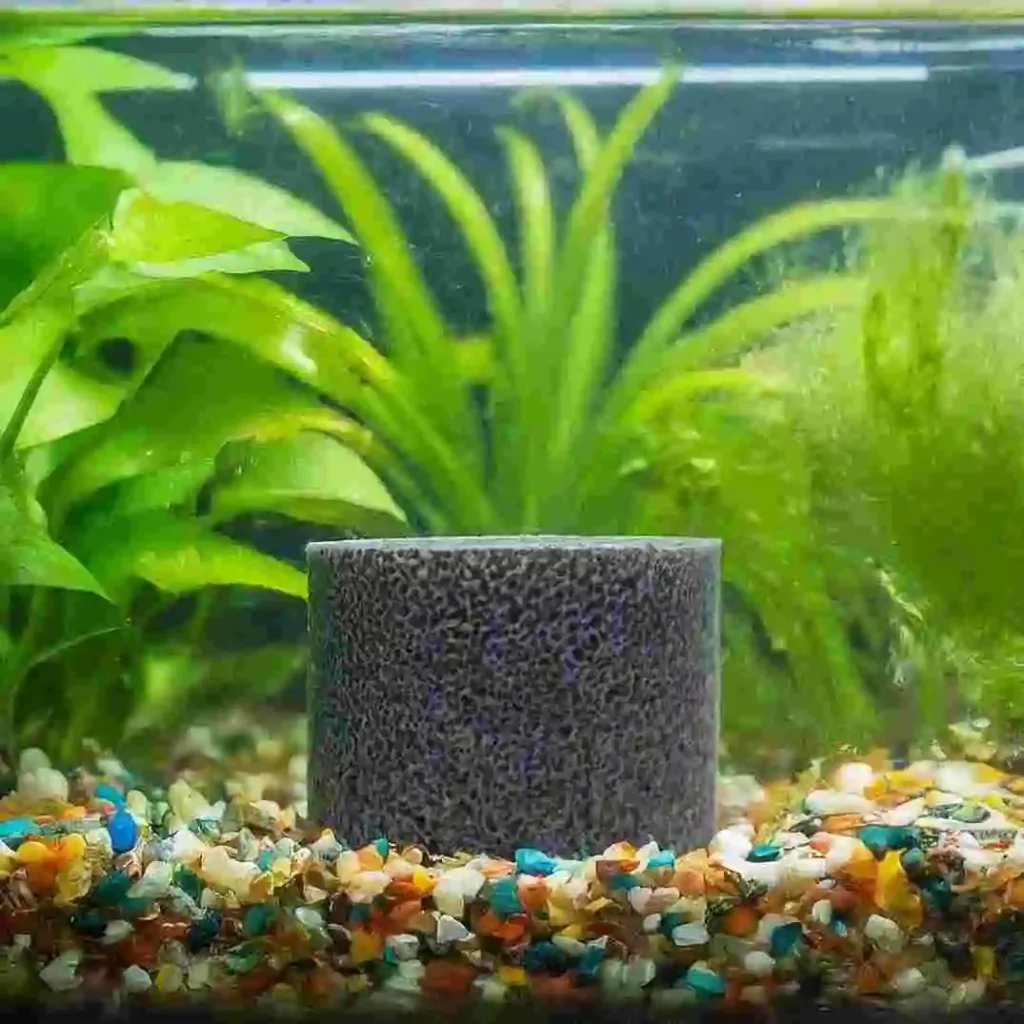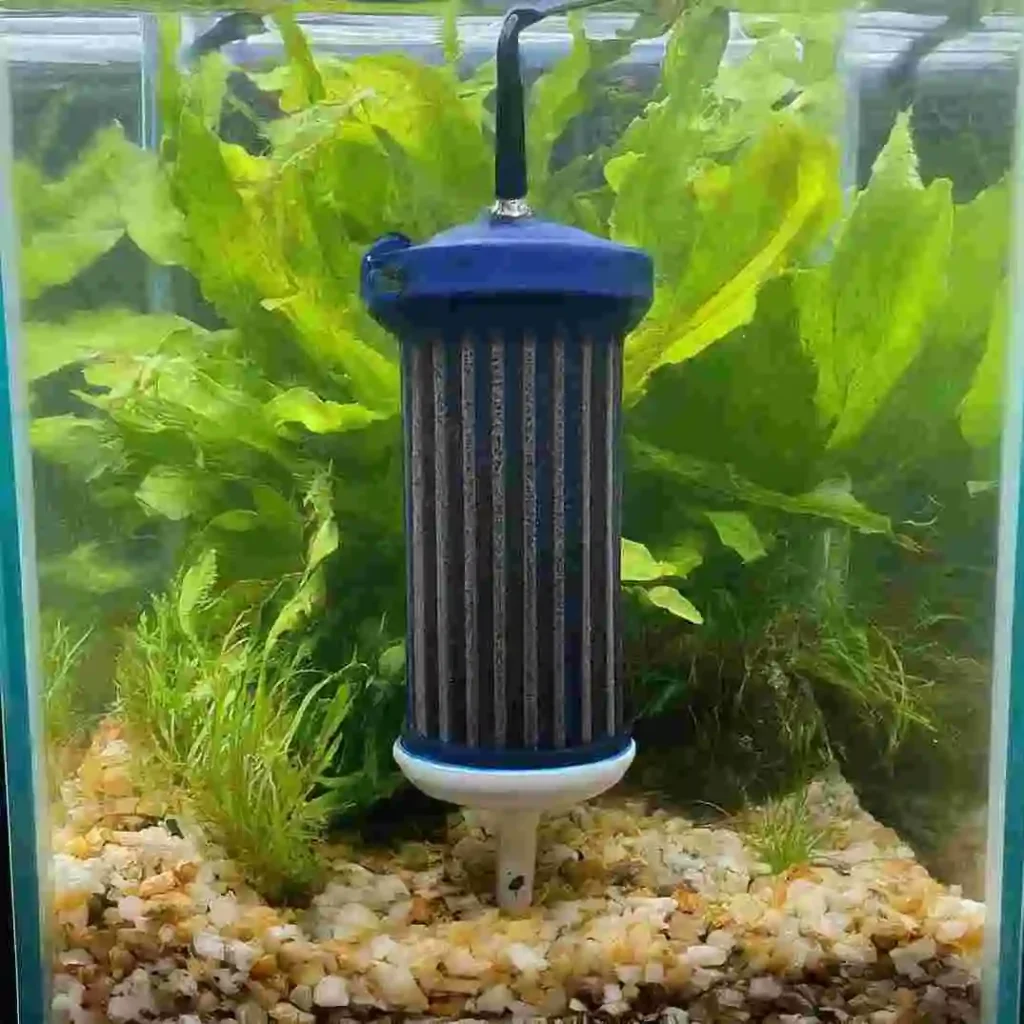Have you ever thought:
- Do Betta Fish Need a Filter?
- How to Care For a Betta Fish Without a Filter?
Let’s find out!
Do Betta Fish Need a Filter?
Yes, betta fish need a filter to survive in a tank.
Few reasons:
1. Keeping the water clean: Filters remove waste and leftover food from the water.
This stops harmful stuff like ammonia and nitrites from building up, which can hurt the fish.
2. Adding oxygen: Filters help oxygen get into the water by creating movement.
Betta fish need oxygen to stay healthy, and a filter helps make sure they get enough.
3. Less work: With a filter, you can clean the tank more often. Using a filter means less cleaning and less work.
4. Helpful bacteria: Some filters have good bacteria that break down harmful stuff in the water.
This helps keep the tank environment stable and safe for the fish.
Alternatives to Filters in Small Tanks (with Cautions)
When it comes to small tanks, there are alternatives to traditional filters that can help maintain water quality.
Some options include live plants, sponge filters, and small water pumps.
1. Frequent Water Changes: In tiny tanks (less than 2.5 gallons), using a filter might make the water move too much for Betta fish.
So, you’ll need to change the water often (2-3 times a week) to keep it clean.
But doing this by hand is tough and can go wrong, especially for beginners.
2. Live Plants: Having real plants in the tank can help soak up some waste, but they won’t do everything a filter does.
Also, taking care of them is specific and might not work for everyone who has Betta fish.
How to Care For a Betta Fish Without a Filter?
To care for a betta fish without a filter, perform regular water changes, keep the tank size appropriate, and monitor the water quality closely.
Avoid overcrowding and feed the fish a balanced diet.
Tank Requirements
1. Size: It’s best to have a tank that’s at least 5 gallons to help keep the water quality stable.
2. Setup: Putting live plants such as Anubias or Java Ferns in the tank can help soak up some ammonia and nitrates, but they can only do so much.
Water Changes
1. Frequency: Change a lot of the water (50-75%) in the tank every week, or even every day or every other day if you can.
2. Treated Water: Always use water that’s been treated to remove chlorine and match the temperature of the tank when you do a water change.
This keeps your fish safe and healthy.
Monitoring
1. Water Parameters: Check the levels of ammonia, nitrites, and nitrates in the water regularly using liquid test kits.
You want the ammonia levels to be so low you can’t detect them, nitrites should be close to zero, and nitrates should be less than 20 parts per million (ppm).
2. Fish Health: Keep a close eye on your Betta fish to catch any signs of stress or sickness, like being less active than usual, fins held close to their body, or not eating.
Additional Considerations
1. Feeding: Give your Betta fish less food to make less waste. If you feed them too much, it can make the water quality worse.
2. Temperature: Keep the water temperature steady between 78-82°F by using a heater in the tank.
Best Filter for a Betta Fish Tank
Choosing the right filter for your betta fish tank depends on the tank size and what you like.
Here are two great choices:
1. Sponge Filter

It is ideal for tanks up to 10 gallons.
Benefits:
- Creates gentle water flow, suitable for betta fish
- Easy to clean and maintain
- Provides a breeding ground for beneficial bacteria
- Relatively inexpensive
2. Hang-on-Back Filter

It is ideal for tanks up to 20 gallons.
Benefits:
- Offers more filtration capacity than sponge filters
- Many models come with adjustable flow rates
- Provides additional surface area for beneficial bacteria
- A wider variety of options is available
Betta Fish Habitats With Filtered Tanks
To create a good home for your Betta fish in a filtered tank, consider these steps:
1. Tank Size: Get a tank that’s at least 5 gallons, but bigger is better for your Betta’s comfort and health.
2. Filtration: Use a gentle filter system that won’t disturb the water too much. Filters like sponges or adjustable flow ones are ideal.
3. Heater: Keep the water temperature consistent between 75-82°F with a submersible heater.
4. Substrate: Use smooth sand or rounded gravel to protect your Betta’s delicate fins.
5. Decorations: Add hiding spots like plants, caves, and driftwood. Make sure decorations are smooth to prevent injuries.
6. Water Quality: Change about 25-30% of the water weekly and use a water conditioner to remove harmful chemicals.
7. Water Testing: Check water parameters regularly to ensure a pH of 6.5-7.5 and zero levels of ammonia and nitrite.
8. Feeding: Feed your Betta high-quality pellets or flakes, supplemented with occasional treats like bloodworms or brine shrimp.
9. Lighting: Give your Betta a regular day-night cycle with gentle lighting. They don’t need bright lights but do well with consistent lighting patterns.
10. Maintenance: Clean the tank and decorations regularly to keep the environment healthy. Watch for any signs of illness and act quickly if needed.
How are Bettas Different From Other Fish?
Betta fish, also called Siamese fighting fish, are special for several reasons:
1. Labyrinth Organ: They have a unique organ called the labyrinth that lets them breathe air from above the water, handy for surviving in places with low oxygen like shallow puddles.
2. Territoriality: Male Bettas are aggressive, showing off their colorful fins to claim territory, a behavior they have from competing for mates in the wild.
It’s not good to keep more than one male Betta in a tank because they might fight.
3. Parental Care: Male Bettas are great dads, building nests for their eggs and protecting them until they hatch into baby fish.
4. Diet: They eat insects, unlike many other fish that eat plants or a mix of things, so they need a diet high in protein.
5. Adaptability: Bettas can live in different water conditions, but it’s important to keep their tank clean and comfortable.
6. Fin Variations: Bettas come in lots of colors and fin shapes because people have bred them to look different.
7. Jumping Ability: They can jump well, which helps them escape danger in the wild. So, it’s important to keep their tank covered.
8. Intelligence and Trainability: Bettas might not be as smart as some other fish, but they can still learn tricks and recognize things like your finger or certain sounds.
Read More:
FAQs
Do Betta Fish Need a Filter in a 5-Gallon Tank?
Betta fish do not necessarily need a filter in a 5-gallon tank, but it is recommended to maintain water quality and provide a healthier environment for the fish.
Is Your Bettas Filter Too Strong?
If your betta is struggling to swim or is constantly being pushed around, your aquarium filter may be too strong.
Do Betta Fish Need a Filter to Survive?
Betta fish do not necessarily need a filter to survive, but having one can greatly improve their water quality and overall health.
How Long Can a Betta Fish Live Without a Filter?
A betta fish can live without a filter for about 2-3 days, but regular water changes should be done to ensure good water quality and betta health.
Do Betta Fish Need a Filter in Their Tank?
Yes, betta fish require a filter in their tank to keep the water clean and oxygenated for their health and well-being.

I love animals & want to know more about different creatures & sharing their stories with everyone. From my childhood, I’ve been exploring forests & watching animals in their homes.
Now, I write about my adventures & all the amazing things I learned. My blogs are easy to understand & make you want to know more about animals. I teach about why animals are important & why we should take care of them.

